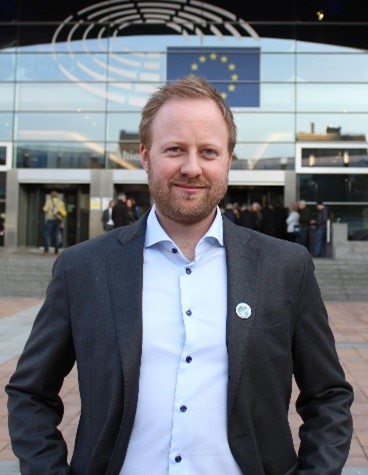Over the past decade, Marine Recreational Fisheries (MRF) have gained substantial socio-economic and environmental importance, while becoming increasingly present in EU policy discussions and decisions, yet an updated EU-wide assessment by EU institutions is still missing.
The last comprehensive study on EU Marine Recreational Fisheries – at EU-scale – already dates back to 2017
(Link).
The lack of updated evidence risks undermining effective policymaking, especially given the upcoming policy changes with the European Oceans Pact, the evaluation of the Common Fisheries Policy (CFP) and other related subjects.
In this context, Markus Lundgren, the European Anglers Alliance (EAA)’s Chair of the Marine Angling Subgroup – provides us with some insights into the subject and outlines why a new, comprehensive study is urgently needed, and how it could support smarter, more inclusive policymaking for Europe’s blue economy.

- Do you feel policymakers currently have sufficient and reliable data to inform legislation concerning the MRF sector? If not, what are the key gaps?
Markus Lundgren: “The short answer is no. The data currently available is fragmented, outdated, and inconsistent across Member States. Without a harmonised EU-wide assessment on the sector —including indicators such as employment, local economic impact, demographic participation, and sustainability practices—legislation risks being based on assumptions rather than evidence."
- Why do you believe an updated EU-wide data on Marine Recreational Fisheries is urgently needed?
Markus Lundgren: “Since 2017, the recreational fisheries sector has been increasingly impacted by a wide range of EU regulations and policy decisions – including e.g. the revised Fisheries Control Regulation, measures set by the Regional fisheries management organisations (RFMOs)[2] that are applicable to EU Member States, and the annual TAC and quota decisions that directly affect the sector through measures such as bag limits, seasonal closures, and other.
Yet, EU policymakers continue to rely on outdated data, creating a disconnect between legislation and current realities. A new study is needed to provide an accurate, current understanding of the sector’s socio-economic contribution to the blue economy.”
In terms of governance, MRF is now subject to tighter regulation than in 2017. How has increased regulation, including the revised Control Regulation and TAC/quota discussions, impacted the sector?
Markus Lundgren: "The growing regulatory framework is not inherently negative. The EAA is working with the European Commission to develop the most adapted tools to collect data on recreational fisheries’ catches. It will be positive to possess sound scientific data about the anglers’ environmental impact and not only rely on estimates.
However, without collecting solid data on the sector’s socio-economic impact as well, policymakers won’t be able to ensure that their decisions are proportionate and effective."
- How does MRF contribute to EU coastal communities, and what should a new EU-wide study measure?
Markus Lundgren: “Marine Recreational Fisheries plays a vital role in boosting coastal economies by supporting tackle shops, charter services, accommodation, and other services. It extends the tourism season beyond traditional periods, stabilising income in rural and coastal regions. A new EU-wide study should measure direct and indirect economic impacts (e.g., FTE jobs, tourism revenue, seasonal distribution), as well as social indicators like accessibility, health benefits, gender participation, citizen science, contribution to social cohesion and nature literacy…. This would allow EU policymakers to grasp the importance of recreational fisheries ahead of its sole environmental impact on fisheries resources”.
- Why should the European Parliament lead this initiative?
Markus Lundgren: "The European Parliament—particularly the PECH Committee—has long supported evidence-based fisheries policy. By formally requesting a new study through their in-house research body EPRS (European Parliamentary Research Service), MEPs can ensure that recreational fisheries’ contribution and impact are fully re-assessed. A request for an updated assessment by the MEPs would send a strong political signal that all forms of sustainable fisheries —both commercial and recreational— merit the EU’s full attention and policy support."
- Finally, what message would you like to convey to EU decision-makers who may still underestimate the contribution of recreational sea fishing to the blue economy?
Markus Lundgren: “Marine recreational fishing is not a niche hobby—it is a vibrant sector that touches millions of Europeans and generates billions in value. Ignoring its impact means missing out on opportunities for sustainable growth, community resilience, and smarter coastal development. It’s time for EU decision-makers to catch up with reality—and that starts with a new, comprehensive study.”